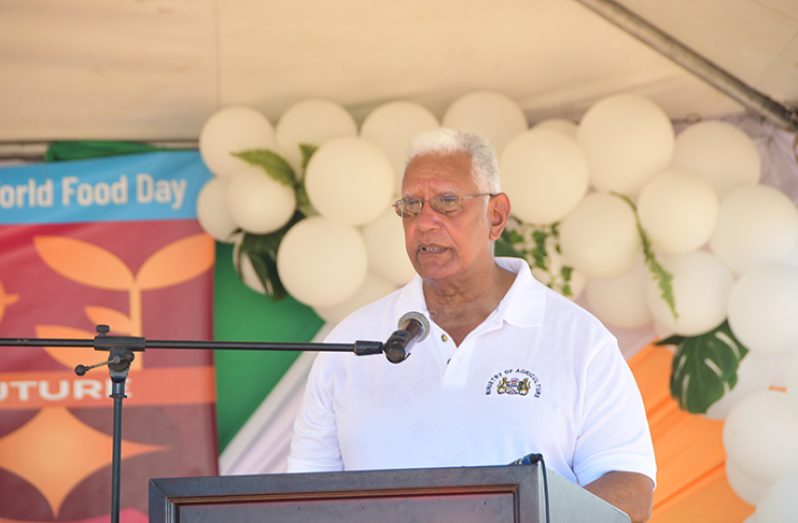THE Guyana Sugar Corporation (GuySuCo) complex at La Bonne Intention (LBI) has been transformed into a major agriculture complex.
“In our thrust for enhanced inter-agency collaboration and to provide a more convenient service to our farmers, the Ministry of Agriculture made a policy decision to relocate a number of our agriculture agencies to our new agricultural complex here at LBI,” said Agriculture Minister, Noel Holder.
He was at the time speaking at a World Food Day 2019 celebration at the new Agriculture Complex, on Wednesday.
The new complex includes GuySuCo’s head office and the head offices of the National Drainage and Irrigation Authority (NDIA), the Guyana Rice Development Board (GRDB), Guyana Marketing Corporation (GMC), the new Food Safety Authority (FSA) and the office of the Representative of the United Nations Food and Agriculture Organisation (FAO).
The agencies will now be closer to their counterparts such as the Guyana School of Agriculture, the National Research and Extension Institute, the Pesticides and Toxic Chemicals Control Board, the Guyana Livestock Development Authority and the Fisheries Department’s Satyadeow Sawh Agriculture Station, which are located at Mon Repos, East Coast of Demerara (ECD).
“By locating most of the ministry’s technical agencies in close proximity to each other, there will be ample opportunity for coordination, collaboration and camaraderie on issues of drainage and irrigation, sugar and rice industries, and agricultural development in general,” said Holder.
With Mon Repos being only a stone’s throw away, this will further enhance and maximise collaboration with the other agricultural entities in the Ministry of Agriculture’s groups of semi-autonomous agencies, bearing in mind the significance of the agriculture sector to Guyana’s economy,” said the minister.
NATIONAL LABORATORIES
During the transition, the former GuySuCo soil and bio-safety research laboratories will become a National Agriculture Soil Testing and Bio-Safety Laboratories, serving the entire agricultural farming community in Guyana.
“As we transition to a ‘green’ economy, quality infrastructure such as laboratories that would test for disease, chemical residue, water quality and the general quality of safe and wholesome products intended for export are essential,” said Minister Holder.
Additionally, for increased productivity, laboratories are needed for soil testing. Bio technology, tissue culture and plant breeding are also the backbone of the inspection and certification activities to meet international standards.
The soil laboratory’s main function is soil fertility management, that is, to track the flow of nutrients in the oil for optimum nutrient levels in crop production. Soil test reports will generally provide appropriate fertiliser application recommendations for the major critical elements, nitrogen, phosphorous, potassium and calcium, as well as needed micronutrients.
Minister Holder said soil testing provides the farmer with a tool that can be employed for potential benefits to increase yields, reduce operating costs and enable greater care for the environment.
Additional benefits include improved crop maturity and quality, higher tolerance to disease and pest damage, and increased growth. The laboratory provides a wide range of testing parameters for soils, plants, water, sugar and other agricultural materials. This lab will now be open to serve the entire agriculture sector.
Meanwhile, the main objective of the National Bio-Control Laboratory is to develop systems to control pests through the use of natural predators instead of using chemical pesticides.
“This fits in with our sustainable agriculture practices for a ‘green’ economy. Integrated Pest Management (IPM) reduces the cost of plant protection and environmental pollution caused by the application of poisonous pesticides, the use of which is reduced significantly, or even eliminated, all to the benefit of our environment and the long-term health of the nation,” said Holder.
The laboratory will be responsible for coordinating research into the plant protection needs for various agricultural crops and propagation of bio-control agents. It will promote integrated pest management for main crops grown in Guyana such as sugar, rice, coconuts and fruits and vegetables.
GuySuCo has been using various methods of bio-control and an integrated pest management programme for many years. GuySuCo does not use any insecticides in its cultivations and this has been true for the last 20 years.
On October 23 and 24, the ministry will also be commissioning the Hydrometeorological Water Quality Laboratory and the Pesticides and Toxic Chemicals Control Board (PTCCB)’s new laboratory, respectively.
The PTCCB’s laboratory will be examining pesticide residues to ensure food safety through monitoring the use, patterns and practices of chemicals, while the water quality laboratory will perform chemical, biological and physical testing of water samples from ground or surface water.
This is in keeping with their mandate outlined in the Water and sewerage Act of 2002 to monitor and evaluate the weather and water resources in Guyana and to actively support the government in disaster risk management.




.png)









